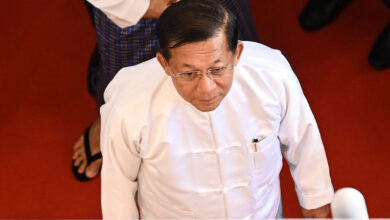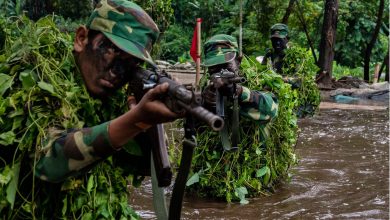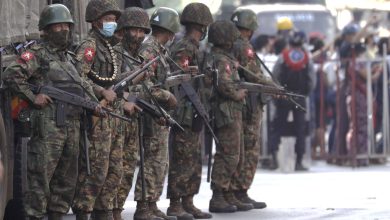
On March 8, U Ko Ko Lay, a 62-year-old teacher, bled to death on a street in the Kachin state capital Myitkyina. He had been shot in the head while protesting the military coup of February 1. That same night, U Zaw Myat Lynn, an official from the National League for Democracy, was taken from his home in Shwepyithar on the outskirts of Yangon and tortured to death. The list keeps growing.
In the more than six weeks since Senior General Min Aung Hlaing seized power, images of soldiers and police officers shooting, beating, and arresting protesters have flooded social media and Myanmar and international news outlets. So far, the regime’s forces have killed well over 200 people (more than half of them in the past week) and seriously injured many more. The junta has also arrested nearly 2,200 people, some of whom, like U Zaw Myat Lynn, have died in custody.
Each day, Myanmar human rights organizations update lists with names, dates, locations, and causes of death. Around 600 police and a handful of soldiers have decided they do not want to be involved in such actions. They have left their posts and even joined the anti-coup movement.
Many soldiers, police officers, and commanding officers are acting with impunity now. But they can face prosecution, not only in Myanmar’s courts but also internationally. Like any country, Myanmar is subject to international law. Because of its history of atrocities, most recently against the Rohingya people, Myanmar is also already subject to special international legal proceedings that apply to the current situation.
The most relevant is the United Nations’ Independent Investigative Mechanism for Myanmar (IIMM). The IIMM was created in 2018 after the Myanmar military’s brutal campaign against the Rohingya people, but it applies to the whole country. Its mission is to investigate “international crimes” from 2011 to the present.
International crimes are generally defined as “widespread and systematic” in nature, involving many victims and locations. These include crimes against humanity, war crimes, and genocide.
In keeping with its mandate, the IIMM is collecting information on the current situation. In a statement released on February 11 (available in Myanmar here), it highlighted the “use of lethal force against peaceful protesters and the detention of political leaders, members of civil society and protesters.”
More recently, on March 17, the IIMM also called on recipients of illegal orders to share this evidence so that those ultimately responsible for these crimes can be held accountable.
“The persons most responsible for the most serious international crimes are usually those in high leadership positions. They are not the ones who physically perpetrate the crimes and often are not even present at the locations where the crimes are committed,” the head of the IIMM, Nicholas Koumjian, says in the statement (available in Myanmar here).
The crimes the IIMM investigates could be tried in Myanmar courts, courts in other countries, or international courts. International crimes are crimes that are so serious that they are considered to be against the international community, and are therefore not limited to courts in one country.
In other words, an international crime committed in Myanmar—for example, widespread and systematic attacks on civilians—can be tried in a court in another country or in an international court.
The Myanmar military is used to getting away with murder. Decades of well-documented killing, rape, and torture of civilians in ethnic minority areas have gone unpunished. No one has ever been tried for the killing of protesters during previous mass uprisings against military rule in 1988 and 2007.
But this time may be different. On March 4, the International Commission of Jurists said in a statement that “the killing of peaceful protesters by Myanmar’s security forces should be independently investigated as possible crimes against humanity.”
The IIMM is already set up and working. It provides a mechanism for just such an investigation. Those doing the shooting should be aware of this.
For further information:
The Independent Investigative Mechanism for Myanmar (IIMM) on Facebook
International Accountability Mechanisms for Myanmar (learning materials in English, Myanmar, and Karen)
Lin Htet is a pen name for a team of Myanmar and international writers



